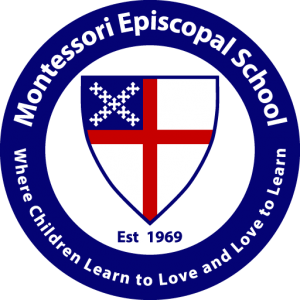Montessori Episcopal Blog
EXPLORE THE MONTESSORI EPISCOPAL BLOG FOR PRACTICAL TIPS, EXAMPLES, AND IDEAS ON INCORPORATING MONTESSORI PRINCIPLES AT HOME. PLUS, STAY UPDATED WITH THE LATEST SCHOOL NEWS AND ANNOUNCEMENTS!
EXPLORE THE MONTESSORI EPISCOPAL BLOG FOR PRACTICAL TIPS, EXAMPLES, AND IDEAS ON INCORPORATING MONTESSORI PRINCIPLES AT HOME. PLUS, STAY UPDATED WITH THE LATEST SCHOOL NEWS AND ANNOUNCEMENTS!
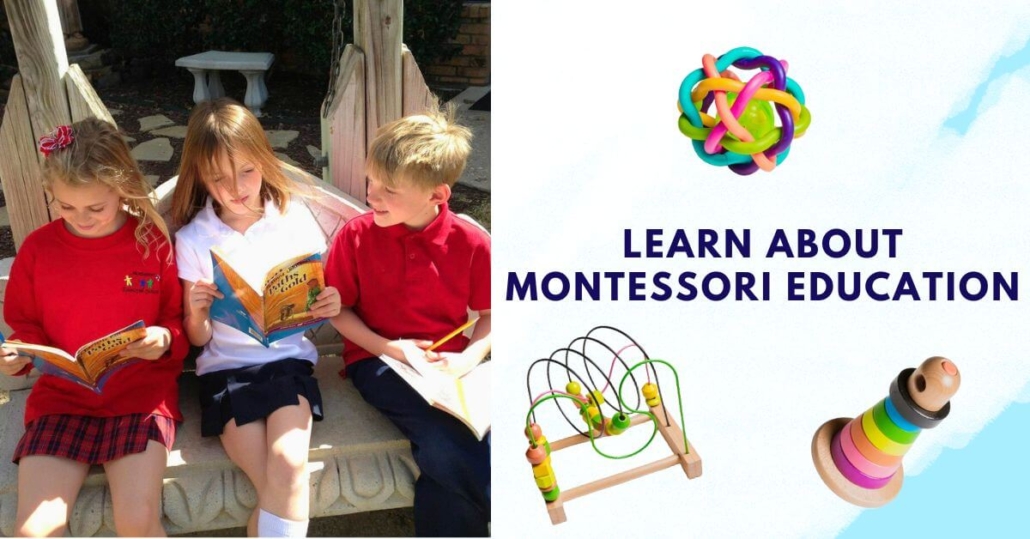
With the Montessori Episcopal Blog in Lewisville,TX
Welcome to the Montessori Episcopal Blog, where we champion the profound impact of education that honors and fosters each child’s holistic development. Delve into the MES Lewisville blog, our exclusive platform, as we explore the core, encounters, and distinctive strategies that blend early childhood education principles with our Episcopal ethos and values.
This blog platform reflects our commitment to fostering an environment where curiosity thrives and learning knows no bounds. Through expert articles, firsthand experiences, and practical advice, we aim to provide our community and beyond with a deeper understanding of our educational method as practiced at MES Lewisville. Join us as we explore the innovative practices that make our educational approach distinct, offering a beacon of inspiration for parents, educators, and all those passionate about early childhood education.
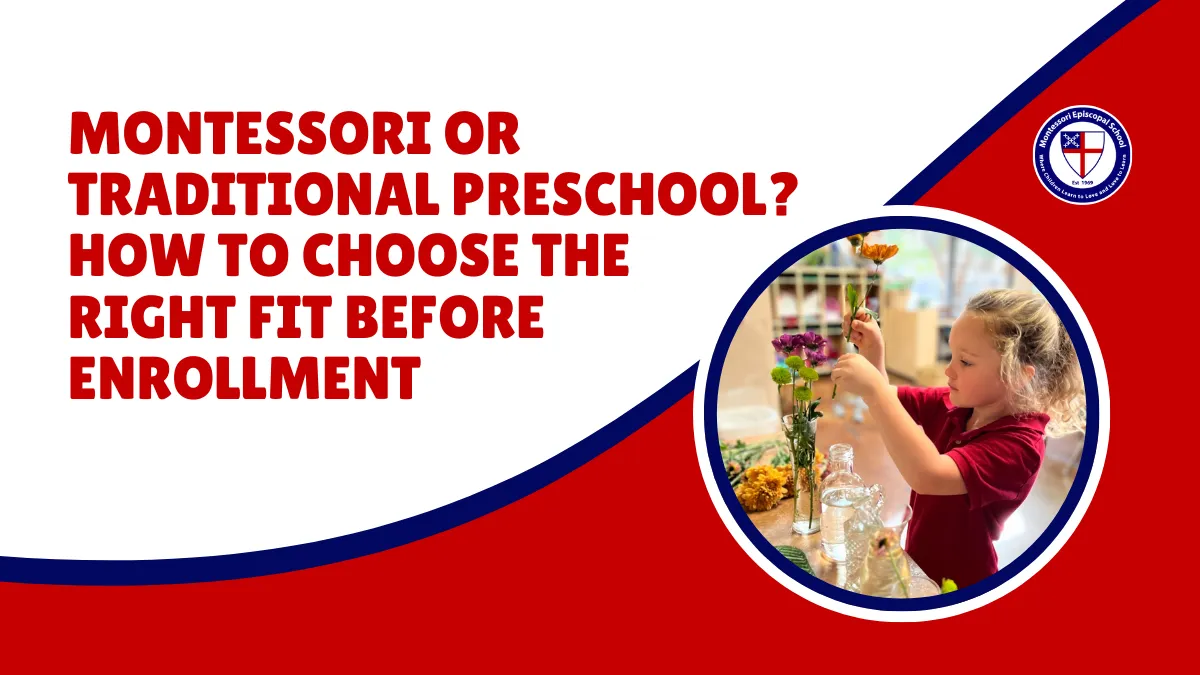
Montessori vs traditional preschool enrollment is one of the most important decisions families make when preparing for early childhood education. Both approaches can support a child’s growth, but they differ in classroom structure, teaching style, and daily expectations.
Montessori programs often emphasize independence, hands-on learning, and individualized progress, while traditional preschools may follow a more teacher-led routine with group-based instruction. Understanding these differences can help you choose the environment that best fits your child’s personality, learning needs, and readiness for school. With the correct information, enrollment can feel less overwhelming and more confident.
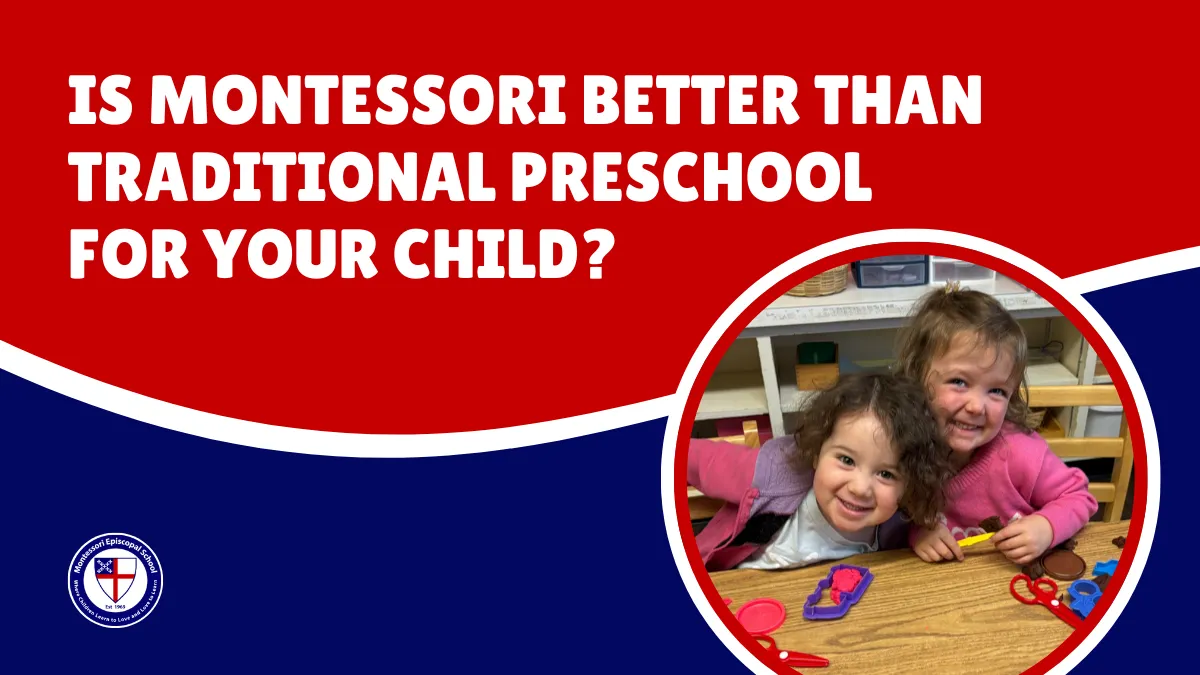
Choosing a preschool is a meaningful decision because the learning environment will shape how your child builds confidence, independence, and early academic skills. Montessori and traditional preschool programs both offer strong benefits, but they support development in different ways. The right choice depends on your child’s personality, learning style, and what your family values most in early education.
Montessori classrooms encourage children to take ownership of their day through purposeful activities and hands-on materials. Children practice real-life skills, work at their own pace, and learn to complete tasks independently, building concentration and self-esteem along the way.
Traditional preschools often follow a teacher-led schedule with group instruction, planned activities, and consistent routines. This structure can be helpful for children who thrive with clear direction and enjoy learning through group participation and guided lessons.
Both settings offer learning, but the daily flow can feel very different. As you compare programs, consider what best supports your child.
Montessori often includes:
Social growth is supported in both approaches, but Montessori classrooms may include mixed-age groups that promote leadership and peer learning. Traditional classrooms usually group children by age and focus on building social skills through teacher-guided play, cooperative activities, and group routines.
Both models can prepare children for kindergarten when the program is high-quality and developmentally supportive. Montessori often strengthens independence, focus, and problem-solving, while traditional preschool may build comfort with group instruction and classroom expectations. The best fit is the one that helps your child feel secure, capable, and excited to learn each day.
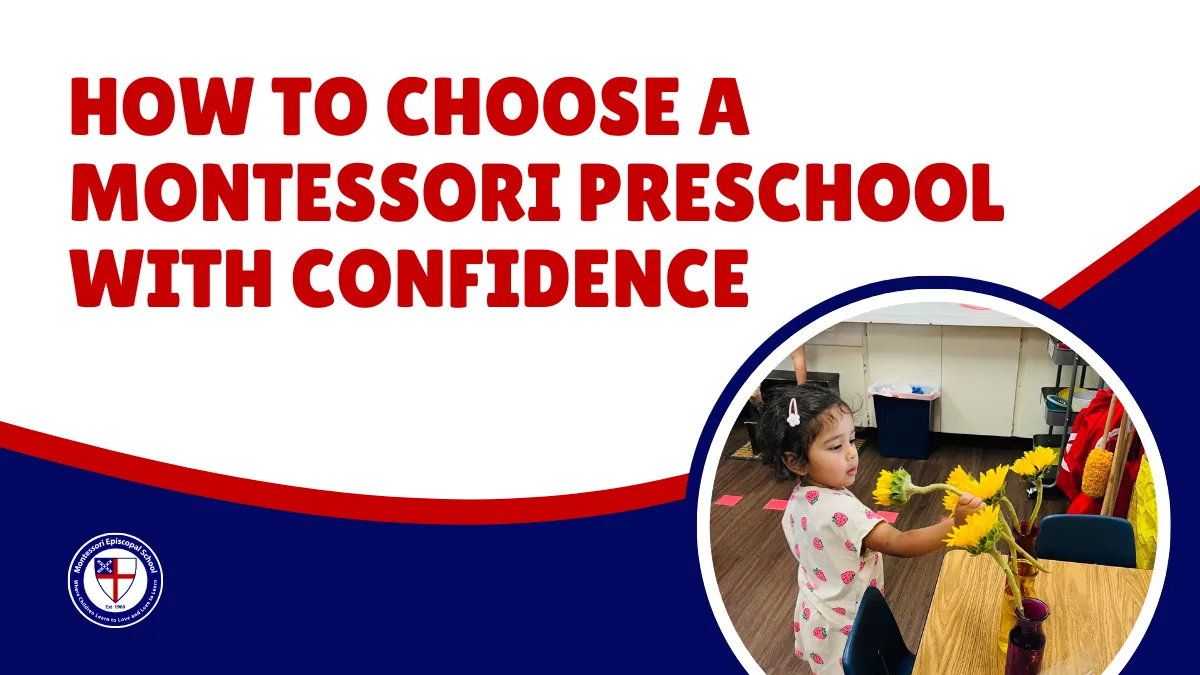
Selecting a Montessori preschool is an important step, especially when you want an environment that supports your child’s independence and love of learning. While many schools may use the Montessori name, not every program follows the method with the same level of consistency and quality. Knowing what to look for can help you feel more confident during the decision-making process and enrollment journey.
Montessori can be a strong match for children who enjoy hands-on learning, prefer calm routines, and show interest in doing things independently. It can also benefit children who need a structured space to build focus, patience, and responsibility over time.
A Montessori classroom should feel purposeful and organized, with materials that support practical life, early math, language, and sensory development. Look for child-sized furniture, clearly defined learning areas, and materials arranged neatly so children can access them independently.
In Montessori, teachers guide rather than lead from the front of the room. They observe, introduce lessons at the right time, and support each child’s progress through individualized learning. A strong program will balance freedom with clear expectations, helping children develop self-discipline and respect for the classroom community.
A tour is one of the best ways to understand how a classroom truly functions. Consider asking questions such as:
A Montessori preschool should feel like a partnership between school and home. Clear family communication, consistent expectations, and a welcoming culture all play an important role. When families feel supported, children benefit from stronger routines, smoother transitions, and a more confident start to their early education.
Montessori enrollment often feels different from a typical preschool sign-up process because the program is designed to support long-term growth and consistent routines. Planning can help families avoid last-minute stress and feel prepared for a smooth start. By reviewing key details early, you can better understand what your child needs and what the school expects during the enrollment period.
Montessori programs typically group children in multi-age classrooms, which supports peer learning and leadership development. Ask about the age range for each classroom, how transitions are handled as children grow, and what placement options are available based on your child’s birth date and readiness.
Before enrolling, confirm whether the school offers full-day, half-day, or extended care options. Montessori environments rely on consistent routines and uninterrupted work periods, so understanding the daily schedule can help you decide what works best for your family.
Helpful details to confirm include:
Montessori classrooms encourage independence, but children do not need to have every skill mastered before they begin. It can be helpful to consider whether your child is ready to participate in a classroom community, follow simple routines, and begin practicing self-help skills such as:
Many Montessori schools encourage ongoing family involvement through conferences, classroom updates, or parent education opportunities. Ask what communication tools the school uses and how families stay informed about progress, classroom goals, and developmental milestones.
Enrollment steps may include a tour, application, classroom observation, or developmental screening. Some schools also have waitlists or specific enrollment windows. Reviewing deadlines, required documents, and start-date expectations early can make the process feel clearer and more manageable for your family.
Montessori and traditional preschool programs both support early learning, but their teaching styles and classroom experiences can feel very different. Understanding how each approach introduces lessons, guides behavior, and supports daily routines can help families choose a setting that matches their child’s needs. The goal is not to find a “better” option, but to identify the environment where your child will feel confident, engaged, and supported.
In Montessori, children are encouraged to choose meaningful work from a carefully prepared environment. Teachers guide learning through observation and individualized lessons, allowing children to build independence and focus. Traditional preschools typically rely on teacher-led instruction, in which the class moves through learning activities together according to a planned schedule and group objectives.
Montessori lessons are often introduced one-on-one or in small groups, and children repeat activities until they feel confident. This supports deeper mastery and helps children build persistence. Traditional classrooms may include some centers or small groups, but learning is usually built around whole-group instruction, with activities designed for the class to complete as a unit.
Montessori may emphasize:
Both teaching styles include structure, but the structure looks different. Montessori classrooms use clear routines, calm pacing, and consistent expectations, while giving children more freedom within boundaries. Traditional preschools often use fixed schedules to guide the day, with activities such as circle time, crafts, storytime, and group play scheduled at set times.
When comparing programs, consider how your child responds to pacing, attention span, and classroom guidance. A strong learning environment should feel supportive, respectful, and developmentally appropriate, regardless of the model it follows.
Choosing between Montessori and traditional preschool is a meaningful decision, and the best choice is the one that supports your child’s growth in a way that feels natural and encouraging. By comparing classroom structure, teaching methods, social development, and daily expectations, families can make a decision based on more than labels alone. A high-quality preschool experience should help your child feel safe, capable, and excited to learn. With careful observation and thoughtful questions, you can find a program that aligns with your child’s personality and your family’s goals for the early years.
Ready to take the next step? Contact Montessori Episcopal School at (972) 895-9050 or use their contact page to schedule a tour and learn more about enrollment: https://montessoriepiscopal.com/contact/.

For many families searching for Montessori school enrollment near me, Montessori Episcopal School stands out as a trusted choice for a strong early start. As parents look ahead to the upcoming school year, they seek a safe, structured, and nurturing setting where children can develop academically, socially, and spiritually.
Montessori Episcopal School provides a balanced approach that blends authentic Montessori methods with Christian values, individualized attention, and a carefully prepared learning environment. Early enrollment allows families to secure a place in this well-regarded program and ensures children have a smooth transition into a consistent, high-quality educational setting.
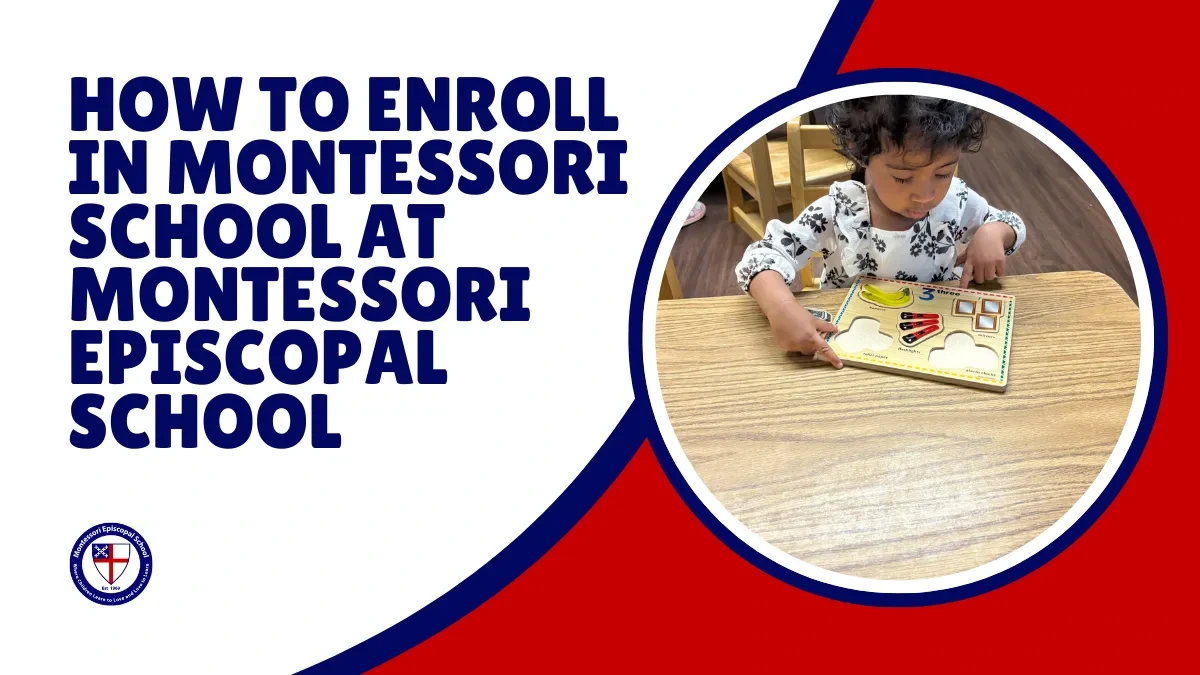 Families learning to enroll in Montessori school at Montessori Episcopal School follow a clear, organized process that respects both the child and the family’s time. The school encourages early planning so that each classroom can welcome a balanced group of students and maintain small, focused class sizes.
Families learning to enroll in Montessori school at Montessori Episcopal School follow a clear, organized process that respects both the child and the family’s time. The school encourages early planning so that each classroom can welcome a balanced group of students and maintain small, focused class sizes.
Enrollment for the upcoming school year typically opens well in advance to allow careful classroom planning. Because each Montessori environment serves a limited number of children, earlier applications receive priority consideration. Families are encouraged to:
Limited financial aid is available, and all related applications must be submitted by the school’s published deadline, which is usually in the spring. Once applications and fees are received, the school confirms placement, subject to space availability, and provides an enrollment confirmation.
To finalize enrollment, Montessori Episcopal School must have complete and accurate records on file. Families should be prepared to provide:
These documents support a safe and consistent environment and help teachers prepare for each child’s successful transition into the classroom.
A campus visit is often the first step in the enrollment process. Families may schedule a tour through the school website or by calling the office. During the visit, parents observe Montessori classrooms, learn about daily routines, and see how Christian values are woven into school life. After the tour, families complete the application, submit all required forms and fees, and receive confirmation once a space has been secured.

Preschool registration at Montessori Episcopal School in Lewisville, TX, follows a structured, thoughtful process that supports both families and children. As a long-established Christian Montessori school in Denton County, Montessori Episcopal School welcomes toddlers through kindergarten-age children into carefully prepared environments that nurture independence, faith, and a love of learning.
Montessori Episcopal School serves families in Lewisville and nearby communities, including Flower Mound and Highland Village. The campus offers:
When families register, they are not only securing a preschool classroom, but also joining a school community that has supported local children for more than fifty years.
Registration begins with determining the appropriate program for each child. Montessori Episcopal School offers:
During the registration process, the school reviews the child’s age, readiness, and schedule to recommend the most suitable placement. The goal is to ensure that each classroom group is developmentally aligned so that children can progress at an appropriate pace within the Montessori framework.
As part of preschool registration, families receive clear information about tuition and fees for the selected program and schedule. Montessori Episcopal School provides:
Limited financial assistance may be available to qualifying families, with applications typically reviewed before the upcoming school year. By completing registration early, families have the best opportunity to select preferred schedules while also planning responsibly for their educational investment.
Families searching for Montessori openings near me often discover that high-quality programs reach capacity well before the new school year begins. At Montessori Episcopal School, planning allows parents to secure a space, choose a suitable schedule, and prepare their child for a confident start in a stable, nurturing environment.
Early enrollment provides several practical and educational advantages. When families plan, they can:
In a Montessori environment, consistency is essential. Confirming enrollment early supports smooth transitions, thoughtful classroom planning, and a more gradual introduction to school routines.
Montessori Episcopal School maintains small class sizes to preserve the integrity of the Montessori approach. Each classroom is designed to support a specific age span, with an emphasis on:
Because spaces are limited, some program levels may reach capacity during popular enrollment periods. In these cases, families may be offered placement on a waitlist. Submitting applications early in the year and responding promptly to enrollment communications helps reduce the likelihood of delays or missed placement opportunities.
Families interested in future Montessori openings at Montessori Episcopal School can take several steps to prepare:
Once a space has been offered and accepted, families receive orientation details and information about the first day of school. With careful planning, children can begin their Montessori experience at Montessori Episcopal School in a setting that is organized, welcoming, and designed for long-term growth.
At Montessori Episcopal School, the educational experience is shaped by both authentic Montessori practice and a Christian worldview. This combined approach supports each child’s intellectual growth, social development, and spiritual formation in a cohesive, structured environment. Children are encouraged to think independently, act responsibly, and understand that they are part of a community grounded in shared values and respect.
In the Montessori classroom, every material and routine is selected with purpose. Children work at low shelves, child-sized tables, and defined learning areas that invite careful movement and focused attention. Through this prepared environment, students develop:
Teachers observe closely, guide individual lessons, and support each child’s natural curiosity. The mixed age structure allows younger children to learn from older peers and older students to build leadership skills. This balanced framework helps children grow in confidence, self-discipline, and a sustained love for learning.
The Christian identity of Montessori Episcopal School contributes an additional layer of formation that extends beyond academics. Faith is integrated through daily routines, chapel services, and a consistent emphasis on Christian virtues such as kindness, honesty, and service to others. Children experience:
Character education is not treated as a separate subject, but as part of each school day. Expectations around courtesy, care for materials, and consideration for classmates are grounded in the understanding that every person is created and valued by God. As a result, students encounter a learning environment in which academic rigor, spiritual life, and moral development work together to support the whole child.
Thoughtful early enrollment at Montessori Episcopal School allows families to secure a place in a setting that is both academically strong and spiritually grounded. By planning, understanding the registration process, and selecting the appropriate program, parents provide their children with an environment that supports independence, curiosity, and character formation. Small class sizes, individualized instruction, and a Christian Montessori framework work together to nurture the whole child and to build a strong foundation for future learning.
To learn more or begin the enrollment process, please get in touch with the school at (972) 895-9050 or submit an inquiry at https://montessoriepiscopal.com/contact/.
Montessori kindergarten readiness checklist items focus on independence, concentration, and social-emotional skills that help toddlers thrive in a child-centered environment. Preparing early means nurturing practical life abilities such as dressing, toileting, and caring for personal belongings, along with respectful communication, grace, and courtesy. Encourage sustained attention through calm routines, limited distractions, and hands-on tasks that […]
Christian Montessori Godly Play activities create a gentle, structured path for faith formation at home. Rooted in Montessori principles, Godly Play invites children to encounter Scripture through tactile materials, purposeful movement, and contemplative silence. A prepared environment—small mat or prayer table, simple figures, and a designated quiet space—supports concentration and reverence. Storytelling with precise, liturgical […]
The benefits of Montessori education extend beyond early academics, shaping confident, curious learners who thrive in school and life. Grounded in a prepared environment and guided independence, children progress at an appropriate pace while building concentration, coordination, and problem-solving skills. Purposeful materials and multi-age classrooms encourage intrinsic motivation, collaboration, and respectful leadership. Daily routines strengthen […]
Choosing a Christian Montessori school in Lewisville is important for families seeking academic excellence and faith-based values for their children. Parents often wish to ensure that the school they select nurtures intellectual growth, spiritual development, independence, and a genuine love of learning. Before enrolling, it’s essential to explore key questions that clarify the school’s educational […]
Montessori preschool extended hours benefits are increasingly recognized by families seeking structured, child-centered education with added flexibility. At institutions grounded in the Montessori philosophy, extended care hours are not simply a convenience but an intentional extension of the learning environment. These programs provide consistency in routine, offer enriched learning opportunities, and support a child’s development […]
Choosing the right early education environment is a critical decision for any family. One of the most compelling options for parents seeking a values-based, child-centered approach is a Christian Montessori program. There are several reasons to choose Christian Montessori school models, especially in communities like Denton County, where spiritual formation and academic growth go hand […]
Montessori certified schools provide a thoughtfully structured environment that supports each child’s natural development. Rooted in the basis of Dr. Maria Montessori, these institutions emphasize hands-on learning, independence, and respect for each student’s unique pace and potential. Unlike traditional educational settings, Montessori-certified schools are guided by trained professionals who understand how to foster intellectual, emotional, […]
Montessori tuition is often a topic of interest for parents seeking a high-quality, child-centered education. At Montessori Episcopal School, we understand that investing in your child’s early years is one of the most important decisions you can make. A Montessori education nurtures independence, curiosity, and a love of learning—laying the foundation for lifelong success. While […]
Montessori Flower Mound provides a nurturing environment where children develop independence, creativity, and a lifelong love of learning. Rooted in the Montessori philosophy, this approach encourages hands-on exploration, critical thinking, and self-paced growth, allowing each child to flourish academically and personally. At Montessori Episcopal School, we combine this proven educational model with a strong sense […]
When searching for a Montessori elementary near me, Lewisville, TX, parents are often drawn to schools that foster a love for learning, independence, and community values. At Montessori Episcopal School, education is a journey of discovery, where children are guided to grow academically, socially, and spiritually in a nurturing environment. With over 50 years of […]
Come visit Montessori Episcopal and discover the difference yourself! Call today or click to schedule.
Instantly download our Practical Life Checklist to discover how to incorporate Montessori skills at home.
Montessori Episcopal School is the only Christian Montessori school in Denton county.
We have been serving Lewisville, Flower Mound and Highland Village toddlers through kindergartners for the past 50+ years.
Montessori Episcopal School turns preschoolers into independent creative thinkers. Our programs have:
